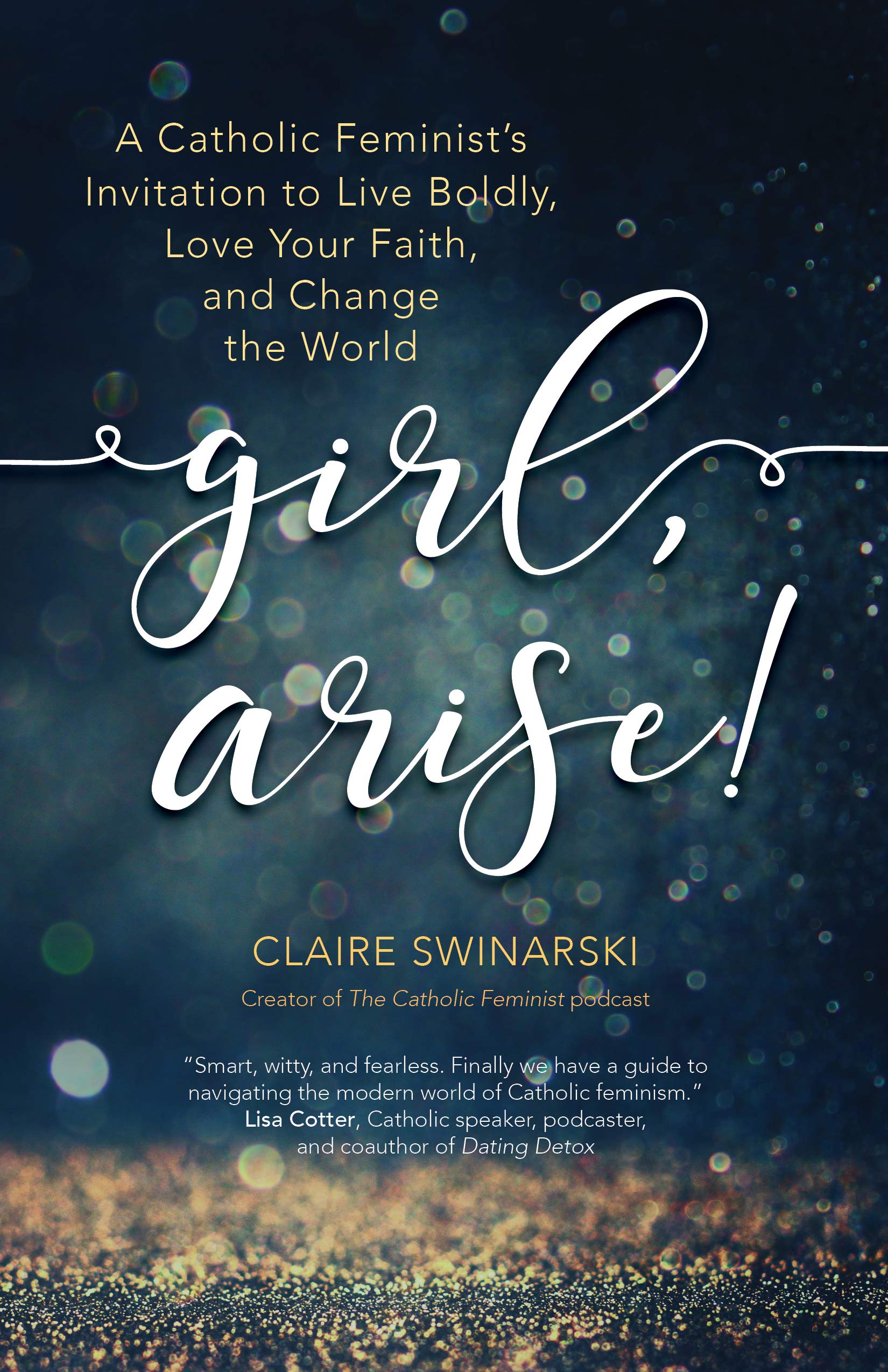Catholic Feminism and the Modern Woman in the Pew
BOOK PICK: Girl, Arise!

Girl, Arise!
By Claire Swinarski
128 pages, $14.95
Ave Maria Press, 2019
To order: avemariapress.com or (800) 282-1865
Although many Catholics nowadays assume the notion of a Catholic feminist is an oxymoron, Claire Swinarski, creator and host of The Catholic Feminist podcast, is out to prove otherwise in her new book, Girl, Arise! Although feminists are often pegged as pro-abortion and anti-male, Swinarski is adamant that this stereotype is inaccurate. “To be a feminist is to believe that women are unique, and equal in dignity to men,” she explains, after declaring that she believes, “the Catholic Church is the most feminist institution in the world.”
In Swinarski’s mind, a person can claim the title “feminist” while also abiding by the laws of the Church. Throughout her book she uses Bible verses as well as quotes by renowned Catholics such as Pope St. John Paul II to assert that Catholicism and authentic feminism go hand in hand.
However, Swinarski, a mother of two in her late 20s, is not shy in her assessment that much work needs to be done in the Church in order to adequately honor and arouse the true potential of women. She describes experiences in which Catholic speakers “reminded me over and over again that the big problems facing me as a young Catholic woman were what I wore and how to treat men.” With lively passion and an entertaining, youthful wit, Swinarski urges Catholic women to consider the bigger issues at hand and rise up to tackle them.
[When] we’re baptized, we’re given a role to play in the world,” she declares. “That role isn’t silent bystander, sister. It’s to partake in the Lord’s divine plan. It’s to live and act on God’s will. It’s to have that moxie — energy, pep, courage and determination — to fight to break the shackles of a fear-based faith.”
Readers should be advised that along with Swinarski’s zeal comes the occasional aura of criticism in her tone. In her efforts to enlighten, she simultaneously comes down rather hard on those who may see and do things differently than she does. For example, “If I hear one more woman claiming that ‘admonish the sinner’ was Jesus’ number one request, I’m going to scream so hard the pearls she’s clutching will fall right off.” The point is valid: We’re called first to demonstrate love before instructing. But her means of communicating will strike some as harsh.
Nonetheless, while reading this book, I developed a liking for Swinarski. Her writing paints her as a spirited, witty individual who’s not only unafraid but actually eager to break the molds that both society and religion have created for females. For example, of cultural feminists and overcritical Catholics, she writes, “They … shove you into boxes in which you don’t belong. Bless ’em. I’m six feet two, y’all. I don’t fit in many boxes.”

Additionally, Swinarski possesses an impressive amount of biblical wisdom. I always appreciate when authors provide contextual explanations for verses that seem harsh or unChristian. Swinarski points to some of St. Paul’s most seemingly sexist exhortations and clarifies his intentions.
For example, of 1 Corinthians 14:34-35, in which Paul declares that women ought not to speak in church and must only learn from their husbands at home, Swinarski explains, “Yes, the early Christians were doing things radically countercultural, but they still needed to work within the context of their societies to effectively evangelize and minister. … Paul wisely understood that women speaking in church — a place they previously hadn’t even been allowed to be — may [scare off newcomers].” I was impressed that someone who considers herself a feminist is so adamant in defending St. Paul. “Paul, in all his complications, affirms women, praises women, and fights for equality for women.”
Essentially, Swinarski’s purpose in Girl, Arise! is to create harmony between Catholicism and authentic feminism, communicating that, at the end of the day, our love for Jesus must outweigh any condemning sentiments we hold. “Our Catholic faith, our relationship with Jesus, has to be front and center of our feminism and our social justice efforts.”
She touches on political issues that are frequent points of contention, such as abortion and immigration. While remaining true to Church teaching, Swinarski challenges readers to bear in mind what Jesus taught about those whom we find most difficult to love. “Catholic feminists believe in uplifting other women, even those who make us want to roll our eyes. We can’t love only people who agree with us. … We have to love the people who don’t agree with us.”
She provides an eye-opening perspective for the current generation that is so fond of social-media rants. After noting that real love entails sacrifice, she remarks, “It doesn’t take much sacrifice to post a think piece about how undervalued mothers are in our society. It takes a lot of sacrifice to offer to watch your friend’s kid on your rare day off. … One of those actions actually provides support and love to our neighbor-mothers. One gives you a buzz of ‘I’m awesome’ energy. We must understand the difference.”
There were many times during Girl, Arise! that I was emphatically nodding, commending Swinarski for the wisdom she articulates. But at other points I found myself uninterested in the actions for which she advocates, not because there’s anything wrong with them but simply because I don’t feel called to embrace them at this point in my life, if ever.
That, however, is perfectly in line with one of Swinarski’s main messages, which is that women in the Church possess vastly different gifts and interests, and we don’t all have to do the same things or look the same way. As she so eloquently puts it, “There’s room at this table. Let’s scoot over.”
Elizabeth Pardi writes from Columbus, Ohio.
- Keywords:
- book picks
- catholic feminism
- elizabeth pardi

















